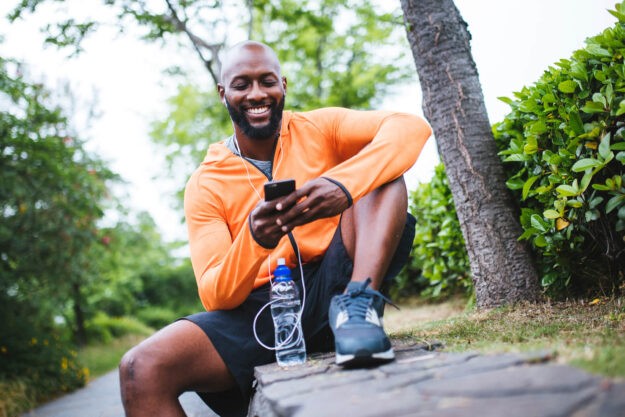 Many well-being companies offer health coaching for employees, but not all programs are created equally. There are several key factors you should be looking for as you assess a health coaching program for your organization. We’ll explore what they are in this week’s blog.
Many well-being companies offer health coaching for employees, but not all programs are created equally. There are several key factors you should be looking for as you assess a health coaching program for your organization. We’ll explore what they are in this week’s blog.
What is health coaching?
Health coaching gives people the personalized attention they need to make real changes in their health and well-being. Health coaches work individually with employees to achieve goals they set together, like quitting smoking, improving diet, staying more socially connected, managing stress, becoming more physically fit, or achieving a different wellness goal.
Because health problems often overlap, a health coach can provide a holistic look at a person’s entire well-being and see how specific areas may be impacting others. A health coach acts almost like a sports coach—providing real-time feedback, encouragement, motivation, and that all-important accountability to help create meaningful long-term improvements.
Why health coaching matters
Coaching is a proven, effective way for organizations to help individuals change unhealthy behaviors and improve critical risk factors. At the same time, it can help reduce both the economic and personal burdens associated with unhealthy lifestyle choices. Individual lifestyle choices can have a significant impact on population healthcare costs.
- Each year, $260 billion is lost in productivity due to sick days, with 69 million workers reporting missing work because of illness.1
- Employees who smoke were estimated to cost employers $900 to $1,383 more than their nonsmoking counterparts.2
- Employees with a BMI above 25 cost $8,067 (more than twice the amount of employees with a BMI under 25; $3,830).3
Coaches can also build of culture of well-being within an organization. Here are a few examples:
- Offering one-on-one coaching to employees assures them that the organization values their well-being and is willing to support efforts on their behalf.
- On-site coaches are visible leaders who can support workplace well-being activities such as lunch-and-learn sessions, health fairs and screenings.
- Individuals who receive coaching can become advocates. When they see positive results in their own lives, they will spread the word through their workplace social networks.
Who should offer health coaching?
Any organization that wants to make significant changes in its employees’ overall health and well-being should offer health coaching services. If you’ve committed to supporting employee wellness and creating an authentic culture of well-being, then health coaching should be part of your approach.
The benefits of health coaching are nearly immeasurable. For example, it can do wonders for those with conditions like high blood pressure, obesity, and diabetes, so if your organization has a high incidence of these, you may want to introduce health coaching to work with participants on lowering their risk factors. But today, health coaching goes beyond the traditional scope of supporting people with serious conditions. It now helps people who just want a bit of motivation in their daily lives or accountability to accomplish a smaller goal, like moving more throughout the day or remembering to make time for self-care. These days, life can be challenging, so having a motivational health coach in their corner can make all the difference for someone who wants to improve their well-being.
What should organizations look for when researching quality health coaching programs?
When doing discovery for a new health coaching program, there are some key things to look out for. These include:
Standards for coach education, certification, and experience.
Health coaches should have specific certifications and experience in the well-being area they provide support in. For example, health coaches should:
- Have at least an undergraduate degree in related health sciences or health promotion fields.
- Hold nationally recognized health and wellness certifications, including general or specialized certifications.
- Be certified for specific health risks or interventions if they provide coaching on those topics, like diabetes, tobacco treatment and weight management.
- Undergo training in approaches such as motivational interviewing and cognitive behavioral therapy.
- Have several years of in-field experience.
Clinical foundation and accreditation.
For a health coaching program to work, many elements should be backed by research, data and behavior change methods. Make sure that the health coaching program you choose has processes and procedures that are supported by proven techniques and clinical foundations. For example, at WebMD Health Services, our health coaching program has:
- Clinical oversight from a chief medical officer and our Clinical Advisory Board.
- Coaches that are hired and trained internally rather than outsource.
- National Committee for Quality Assurance (NCQA) Accreditation and Certifications in the following areas:
- Wellness and Health Promotion
- Disease Management
- Health Information Product Support for Healthy Living
Ease of use.
Participants must be able to easily access health coaching services in order to benefit from them. If you decide to host health coaches onsite, make sure their office is in a convenient, well-trafficked location for maximum exposure. For remote health coaching, there should be a variety of ways to connect—via text, chat in an app, phone, and video. Health coaching hours should also be convenient for participants—which may entail early morning or evening.
A personalized program.
Every individual is different, which means a one-size-fits-all approach won’t be successful. Instead, health coaches must tailor their programs to each participant and their individual goals. Coaches should have access to all available data on a participant—like a health assessment and any biometric screenings—to make appropriate recommendations. In addition to health data, coaches also need to consider a person’s lifestyle, family responsibilities, the type of work they do, and other elements that may impact their well-being progress and realistic goals.
Seamless integration with other well-being program components.
A good health coaching program shouldn’t exist on an island. Ideally, it should connect with other well-being program partners and resources your company offers—like Employee Assistance Programs, additional mental health support like podcasts or meditation apps, weight loss partners, and condition management programs. Health coaches should be able to see which resources are available to the participant—including external partners—so they can make suitable recommendations and hand-offs to the appropriate resources.
Ongoing training.
The science of health and well-being changes all the time, so it’s essential to ensure that coaches are up-to-date with continuing education and training. For example, our WebMD Health Coaches are required to complete an approved health coaching certification, including:
- NCHEC’s Certified Health Education Specialist
- American College of Sports Medicine’s Certified Exercise Physiologist
- National Board Certified Health & Wellness Coach
- and more!
Additionally, we encourage and incent coaches to obtain additional certifications and the continuing education credits necessary to maintain them. WebMD Health Services is an Approved Continued Education Provider through the American Council on Exercise, which allows our monthly, internally-delivered health education training to count toward staff’s continuing education credits to uphold these certifications.
We also empower our own staff to create and lead training based on their areas of expertise. For example, we recently had one of our Mental Health Coaches conduct training around stress reduction techniques such as guided imagery, 4-7-8 breathing, caregiver stress tips, and stress referrals for participants looking for ways to manage their stress. We also regularly ask for formal feedback from clients about ways we can better contribute to their culture of well-being through health coaching.
Ongoing feedback and quality assurance.
When it comes to coaching calls, a dedicated quality assurance department can also help to ensure that each interaction with a participant is of the highest quality. For example, at WebMD Health Services, we have a separate training and quality assurance department that’s responsible for listening to calls and providing feedback and training to health coaches to improve the participant experience.
On average, our health coaches receive three hours of training each month on:
- Health education topics
- Behavior change and goal setting strategies
- Refreshers on internal workflows and protocols
- Client updates
- Quality improvement tips
A caring experience.
Finally, make sure the coaches in your health coaching program genuinely care. It’s not easy for participants to talk about personal issues like health and well-being, so insist that health coaches are compassionate individuals who are inspired by improving the lives of others.
Should a health coaching program include incentives?
While rewards are not essential to a health coaching program, they provide that initial motivation to try out the program and—hopefully—stick with it. For example, participants could get a small reward for signing up for an initial consultation or achieving a certain goal that is part of their plan, like walking a specific number of steps per day.
What are some best practices for ensuring a successful health coaching program?
Like so many things, when you launch a health coaching program you need to keep a keen eye on the details and maintain a strong partnership with your chosen vendor. When preparing your timeline, make sure you address these six key areas:
Timing Requirements.
You may have specific timeframes in which people can register for a program—keep these in mind as you start planning. Review your plans for stratifying participants in certain coaching programs. Be sure to put the right protocols in place. For example, you may opt to launch a lifestyle coaching program to everyone in your population but a condition management coaching program only to certain people based on their health assessment, biometrics screening or claims analysis results.
Rewards Tracking & Fulfillment.
If you offer rewards for coaching participants, then you’ll need to set up the methods for tracking actions and engagement. This will ensure that people receive proper credit for their efforts. You also should track rewards for budget and reporting purposes. For tips on how to structure your rewards for maximum success, check out our e-book, 7 Steps to Smart Incentive Design.
Communication.
It goes without saying, but employees have to know the health coaching program exists, or they won’t be able to take advantage of it. So, several months before the program begins, promote it in regular communication vehicles, like workplace social media, Slack channels, all-employee meetings, banners on the intranet, mailers, emails, and other areas. Include links for more information on health coaching, and provide instructions on how to contact a health coach. In these communications, it’s also critical to head off any concerns people may have around privacy and reassure them that their personal health information will not be shared with the company. Check out our e-book, Well-Being Program Communications to learn about additional best practices.
Leadership.
Leaders need to demonstrate to the organization that health and well-being are a business priority. Ask leaders to mention the health coaching program in town halls and videos. You could even enlist a leader to sign up as a coaching participant and share their experience. What’s most important is that employees know that leaders support the program.
Well-being champions.
Employees who are passionate about well-being are often in the best position to encourage fellow employees to take advantage of coaching. If you don’t already have a wellness champion network, the launch of a coaching program can be a perfect time to form one. Get a jumpstart from our toolkit, Building Your Well-Being Champion Network.
Evaluation.
The most successful coaching programs track utilization and outcome metrics over time, as well as year-over-year value on investment. Determine your evaluation requirements before you implement your coaching program. Otherwise, you may find yourself at the end of the year without the data you need to make important decisions. Here are 4 tips for measuring your coaching program:
- Engage: Begin assessing engagement rates through the first four to six months of the program so you can see how they trend.
- Focus: Focus on an engagement rate that reflects the actual coaching sessions that your population has completed. Metrics like mailings and site logins are important, but should be secondary.
- Conduct: Conduct a participant feedback survey. You’ll collect valuable firsthand accounts of the coaching experience.
- Measure: To measure behavior changes over time, first create a cohort group and identify the time points at which you’ll measure your data.
We know that people can grow and thrive when they have access to integrated well-being programs and personalized education and guidance. Companies that offer coaching programs to their populations stand to gain, too. From increased morale to improved productivity to reduced health risks, the benefits can touch many areas of an organization. Our coaching experts have helped participants learn to take control of their well-being during more than 6 million coaching sessions using a whole-person approach that addresses multiple conditions and behavior-change needs.
Are you interested in starting a health coaching program for your organization? Visit our website or contact us at connect@webmd.net.




